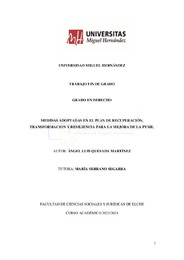Por favor, use este identificador para citar o enlazar este ítem:
https://hdl.handle.net/11000/33251Registro completo de metadatos
| Campo DC | Valor | Lengua/Idioma |
|---|---|---|
| dc.contributor.advisor | Serrano Segarra, María | - |
| dc.contributor.author | Quesada Martínez, Ángel Luis | - |
| dc.contributor.other | Departamentos de la UMH::Ciencia Jurídica | es_ES |
| dc.date.accessioned | 2024-09-20T08:51:34Z | - |
| dc.date.available | 2024-09-20T08:51:34Z | - |
| dc.date.created | 2024-06 | - |
| dc.identifier.uri | https://hdl.handle.net/11000/33251 | - |
| dc.description.abstract | En el presente Trabajo de Fin de Grado, se lleva a cabo un estudio del Plan de Recuperación, Transformación y Resiliencia español y su repercusión en el tejido empresarial conformado por las Pequeñas y Medianas Empresas (pymes) españolas. Este trabajo va a hacer especial hincapié en la identificación y análisis de los principales desafíos y objetivos que las pymes van a tener que hacer frente una vez se ha implementado el Plan, constituyendo estos aspectos, el núcleo central del estudio. Más allá de abordar en profundidad el terreno de la digitalización y sus implicaciones, también se destacaran las nuevas regulaciones mercantiles que guardan una relación directa con la digitalización que se ha ido produciendo en dicho tejido empresarial, así como también las reformas que el Plan de Recuperación, Transformación y Resiliencia español ha ido planteando, así como también las reformas que van a ser aplicadas. Para finalizar dicho trabajo, nos adentraremos en el estudio del sector ecológico, ligado al Componente 13. En dicho sector vamos a instaurar las nociones básicas que son planteadas por el plan, así como por último una explicación del principio “do not significant harm”. | es_ES |
| dc.description.abstract | In this Final Degree Project, a study is carried out of the Spanish Recovery, Transformation and Resilience Plan and its impact on the business fabric made up of Spanish Small and Medium Enterprises (pymes). This work will place special emphasis on the identification and analysis of the main challenges and objectives that pymes will have to face once the Plan has been implemented, these aspects constituting the central core of the study. Beyond addressing in depth the field of digitalization and its implications, the new commercial regulations that have a direct relationship with the digitalization that has been taking place in said business fabric will also be highlighted, as well as the reforms that the Recovery Plan, Transformation and Resilience Spanish has been proposing, as well as the reforms that are going to be applied. To finish this work, we will delve into the study of the ecological sector, linked to Component 13. In this sector we will establish the basic notions that are raised by the plan, as well as finally an explanation of the principle “do not significant harm”. | es_ES |
| dc.format | application/pdf | es_ES |
| dc.format.extent | 51 | es_ES |
| dc.language.iso | spa | es_ES |
| dc.publisher | Universidad Miguel Hernández de Elche | es_ES |
| dc.rights | info:eu-repo/semantics/openAccess | es_ES |
| dc.rights | Attribution-NonCommercial-NoDerivatives 4.0 Internacional | * |
| dc.rights.uri | http://creativecommons.org/licenses/by-nc-nd/4.0/ | * |
| dc.subject | Plan de Recuperación | es_ES |
| dc.subject | Transformación y Resiliencia | es_ES |
| dc.subject | pymes | es_ES |
| dc.subject | Recuperación Económica | es_ES |
| dc.subject | Digitalización | es_ES |
| dc.subject | Recovery Plan | es_ES |
| dc.subject | Transformation and Resilience | es_ES |
| dc.subject | Economic Recovery | es_ES |
| dc.subject | Digitalization | es_ES |
| dc.subject.other | CDU::3 - Ciencias sociales::34 - Derecho | es_ES |
| dc.title | Medidas adoptadas en el plan de recuperación, transformación y resiliencia para la mejora de la PYME | es_ES |
| dc.type | info:eu-repo/semantics/bachelorThesis | es_ES |

Ver/Abrir:
TFG ANGEL LUIS FINAL.pdf
1,1 MB
Adobe PDF
Compartir:
 La licencia se describe como: Atribución-NonComercial-NoDerivada 4.0 Internacional.
La licencia se describe como: Atribución-NonComercial-NoDerivada 4.0 Internacional.
.png)